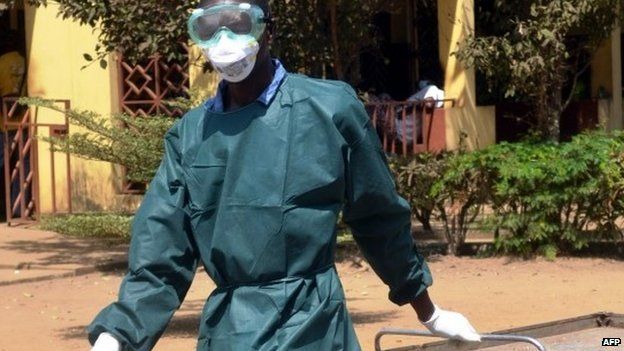Sierra Leone Ebola patients removed from clinic
- Published

Six people suspected of having the deadly Ebola virus in Sierra Leone have been "aggressively" taken away from a clinic by their relatives, in defiance of medical staff, an official has said.
One of them has died amid fears that the highly contagious virus could spread, the official added.
It is not clear why the relatives took the patients away.
Nearly 200 people have died of Ebola in West Africa since an outbreak was first reported in Guinea in March.
There is no cure or vaccine for Ebola - one of the world's deadliest viruses.
But people have a better chance of surviving if it is identified early and they get supportive medical care.
Ebola can kill up to 90% of those infected and is passed on through contact with the fluids of infected people or animals, such as urine, sweat and blood.
Ebola virus disease (EVD)
- Symptoms include high fever, bleeding and central nervous system damage
- Fatality rate can reach 90%
- Incubation period is two to 21 days
- There is no vaccine or cure
- Supportive care such as rehydrating patients who have diarrhoea and vomiting can help recovery
- Fruit bats are considered to be the natural host of the virus
Dr Amara Jambai, the director of disease prevention and control at Sierra Leone's health ministry, told the BBC that staff at the clinic in Koindu town in eastern Sierra Leone had tried to stop the six patients from being removed.
However, the families had been "aggressive" as they took their relatives away, he said.
The BBC's international development correspondent Mark Doyle says while it is unclear why relatives did this, a Sierra Leonean official speculated that it was because they thought their loved ones would die in the clinic or on transfer to a hospital in Kenema, the main city in the region.
Four of the six had already tested positive for Ebola, and one them had died after being removed from the clinic, Dr Jambai said.
The authorities did not know where the others were and were now very concerned they could spread the disease, he added.
Dr Jambai said two people had so far died of Ebola in Sierra Leone, and not four as previously reported.
Guinea has been worst-affected, with 258 suspected and confirmed cases of Ebola, including 174 deaths - 146 of which have been laboratory-confirmed positive.
In Liberia there have been 12 suspected cases, with nine deaths.
A spokesman for the World Health Organisation (WHO) in Geneva said Ebola was often spread when family members, trying to care for a relative, came into contact with infected body fluids.
The WHO says treatment by qualified personnel can sometimes help patients and reduces the risk of outbreaks spreading.
- Published24 April 2014
- Published3 April 2014
- Published8 October 2014
- Published1 April 2014
- Published14 May 2018
- Published25 March 2014
- Published6 December 2011